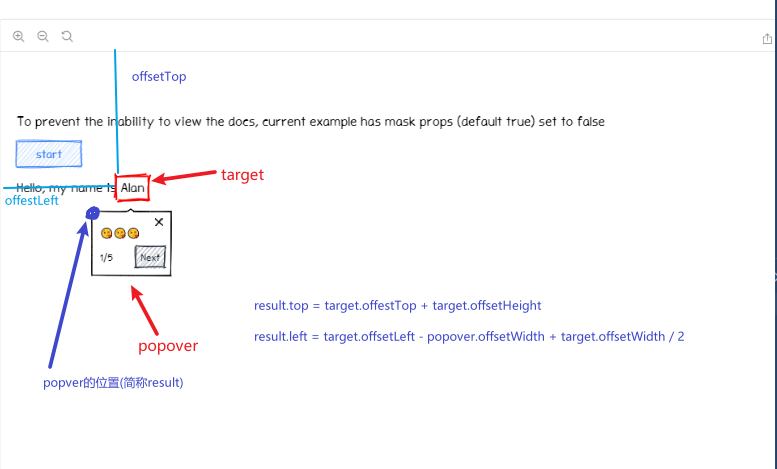https://mp.weixin.qq.com/s/vrDQEGgOSnKBvHuwZV6vSA
https://github.com/gilbarbara/react-joyride
https://github.com/bytedance/guide
本文章只介绍大致思路,一些细节的实现请查看源码
功能需求
- 以
popover的形式附着在目标元素上,以达到解释目标元素效果。 - 存在多个目标元素时,提供上一步/下一步/结束三个按钮。
- 当元素超出可视区域时,自动滚动到目标元素的位置。
- 屏幕大小变化时,
popover能始终附着在目标元素上
确认api
确认了功能需求后,就需要来设计api了,由于我的组件功能还算比较单一,所以api设计的也比较简单。
// 是否显示遮罩层
mask?: boolean;
steps: StepItem;
onClose?: (finished: boolean) => void;
这3个api都比较好理解,主要讲以下steps。
因为popover需要附着在目标元素上,所以要获取目标元素的位置,可以使用document.querySelector()来实现,那么可以明确steps中需要提供一个selector参数。
于是我们基本可以确认好StepItem的内容。
/**
* 目标元素选择器
*/
selector: string;
/**
* popover内容
*/
content: ReactNode;
前置知识
-
React.createPortal
-
HTMLElement.offsetParent
返回一个指向最近的(指包含层级上的最近)包含该元素的定位元素或者最近的 table,td,th,body元素。当元素的 style.display 设置为 “none” 时,offsetParent 返回 null。 -
HTMLElement.offsetXXX
相对于offsetParent -
Element.getBoundingClientRect()
返回元素大小(包括border+padding)以及相对视口的位置https://developer.mozilla.org/zh-CN/docs/Web/API/HTMLElement/offsetWidth
-
clientWeight/clientHeight
https://developer.mozilla.org/zh-CN/docs/Web/API/Element/clientWidth
我写的例子以便理解
开始编码
项目中使用了rough-notation这个库,主要为了实现一些手绘效果以及动画,我会将相关代码剔除,以免影响主线思路。
首先使用两个变量currentIndex和currentContent来控制当前的step
useEffect(() => {
handleStepChange();
}, [currentIndex]);
分析一下handleStepChange要实现什么
- 通过
props.steps[currentIndex].selector获取当前的目标元素并获取其offsetParent(后面称为parent) - 使用
React.createPortal将popover渲染到parent节点中 - 由于
popover现在的父节点已经是目标元素的父节点(即与目标节点互为兄弟节点),所以只需要再相对于parent进行绝对定位调整位置即可。 - 判断目标元素是否在可视区域内,没有的话就滚动到目标元素的位置
const handleStepChange = () => {
const {
selector, content } = steps[currentIndex];
const e = document.querySelector(selector) as HTMLElement;
const parent = (e.offsetParent || document.body) as HTMLElement;
setParentEl(parent);
// 判断是否在可是区域内
const isVisible = isElementVisible(selector);
if (!isVisible) {
e.scrollIntoView({
behavior: 'smooth', block: 'center' });
}
// 计算popover相对于parent的偏移量
computePopoverStyles();
setCurrentContent(content);
};
// <PopoverContent />为popover内容,理解成一个div就行,只是加了一点样式而已
{
createPortal(<PopoverContent />, parentEl)}
popover内容
<div className={`${cls}-inner`}>
<div className={`${cls}-content`}>{currentContent}</div>
<div className={`${cls}-footer`}>
<span>
{currentIndex + 1}/{steps.length}
</span>
{currentIndex !== 0 && (
<Button type="standard" size="small" onClick={() => setCurrentIndex(currentIndex - 1)}>
Prev
</Button>
)}
{currentIndex !== steps.length - 1 && (
<Button type="standard" size="small" onClick={() => setCurrentIndex(currentIndex + 1)}>
Next
</Button>
)}
{currentIndex === steps.length - 1 && (
<Button size="small" onClick={handleClose}>
finish
</Button>
)}
</div>
</div>
监听窗口变化
这里的computePopoverStyles主要就是计算相对于parent的绝对定位偏移量。
// 使用防抖,优化手段
const { run: handleResize } = useDebounceFn(computePopoverStyles, { wait: 200 });
useEffect(() => {
window.addEventListener('resize', handleResize);
return () => {
window.removeEventListener('resize', handleResize);
};
}, []);
计算偏移量
